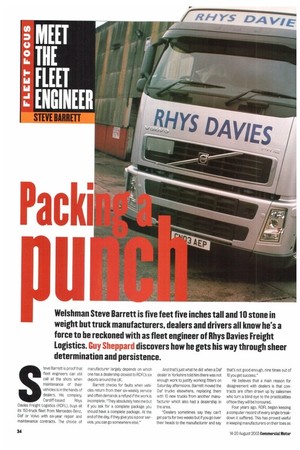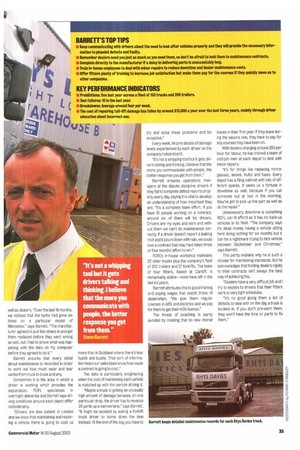Welshman Steve Barrett is five feet five inches tall and
Page 34

Page 35

If you've noticed an error in this article please click here to report it so we can fix it.
10 stone in weight but truck manufacturers, dealers and drivers all know he's a force to be reckoned with as fleet engineer of Rhys Davies Freight Logistics. Guy Sheppard discovers how he gets his way through sheer determination and persistence.
Steve Barrett is proof that fleet engineers can still call all the shots when maintenance of their vehicles is in the hands of dealers. His company,
Cardiff-based Rhys Davies Freight Logistics (RDFL), buys all its 150-truck fleet from Mercedes-Benz, Daf or Volvo with six-year repair and maintenance contracts. The choice of manufacturer largely depends on which one has a dealership closest to RDFL's six depots around the UK.
Barrett checks for faults when vehicles return from their six-weekly service and often demands a refund if the work is incomplete. "They absolutely hate me but if you ask for a complete package you should have a complete package. At the end of the day, if they give you a poor service, you can go somewhere else." And that's just what he did when a Daf dealer in Yorkshire told him there was not enough work to justify working fitters on Saturday afternoons. Barrett moved the Daf trucks elsewhere, replacing them with 10 new trucks from another manufacturer which also had a dealership in the area.
"Dealers sometimes say they can't get parts for two weeks but if you go over their heads to the manufacturer and say that's not good enough, nine times out of 10 you get success."
He believes that a main reason for disagreement with dealers is that contracts are often drawn up by salesmen who turn a blind eye to the practicalities of how they will be honoured.
Four years ago, RDFL began keeping a computer record of every single breakdown it suffered. This has proved useful in keeping manufacturers on their toes as well as dealers. "Over the last 18 months, we noticed that the turbo had gone six times on a particular model of Mercedes," says Barrett. The manufacturer agreed to pull the others in and get them replaced before they went wrong as well, but I had to prove what was happening with the data on my computer before they agreed to do it."
Barrett ensures that every detail about maintenance is recorded in order to work out how much wear and tear varies from truck to truck and why,
Sometimes it is the area in which a driver is working which provides the explanation. RDFL specialises in overnight deliveries and Barrett says driving conditions around each depot differ considerably.
"Drivers are less patient in London and we know that maintaining and repairing a vehicle there is going to cost us more than in Scotland where there's less hustle and bustle. That sort of information helps our sales team know how much a contract is going to cost."
The data is particularly enlightening when the cost of maintaining each vehicle is matched up with the person driving it.
"Maybe a truck is getting an unusually high amount of damage because, on one particular drop, the driver has to reverse 20 yards up a narrow lane," says Barrett. "It might be avoided by asking a forklift truck driver to come down the lane instead. At the end of the day, you have to try and solve these problems and be proactive."
Every week, he pins details of damage levels experienced by each driver on the company notice board.
It's not a whipping tool but it gets drivers talking and thinking. I believe that the more you communicate with people, the better response you get from them."
Barrett ensures operations managers at the depots discipline drivers if they fail to complete defect reports properly every day, saying it is vital to develop an understanding of how important they are. "It's a complete team effort. If you have 10 people working on a contract, around six of them will be drivers. Drivers are my eyes and ears and without them we can't do maintenance correctly. If a driver doesn't report a leaking roof and it pours down with rain, we could lose a contract that may have taken three or four months' effort to win."
RDFCs in-house workshop maintains 22 older trucks plus the company's fleet of 200 trailers and 57 forklifts. The team of four fitters, based at Cardiff, is remarkably stable—none have left in the last six years.
Barrett attributes this to good training and paying wages that match those of dealerships. 'We give them regular courses in ABS and electrics and we pay for them to get their HGV licence."
The threat of poaching is partly avoided by insisting that no new recruit leaves in their first year. If they leave during the second one, they have to pay for any courses they have been on.
With dealers charging around 250 per hour for labour, he has trained a team of odd-job men at each depot to deal with minor repairs.
"It's for things like replacing mirror glasses, lenses, bulbs and fuses. Every depot has a filing cabinet with lots of different spares. It saves us a fortune in downtime as well, because if you call someone out at two in the morning, they've got to pick up the part as well as do the repair."
Unnecessary downtime is something RDFL can it afford as it has no back-up vehicles in its fleet. "The company says it's dead money having a vehicle sitting here doing nothing for six months but it can be a nightmare trying to hire vehicle between September and Christmas," says Barrett.
This partly explains why he is such a stickler for maintaining standards. But he acknowledges that holding dealers rigidly to their contracts isn't always the best way of achieving this.
"Dealers have a very difficult job and! try to explain to drivers that their fitters work to very tight schedules.
"It's no good giving them a list of defects to deal with on the day a truck is booked in. if you don't pre-warn them, they won't have the time or parts to fix them."
































































































































































